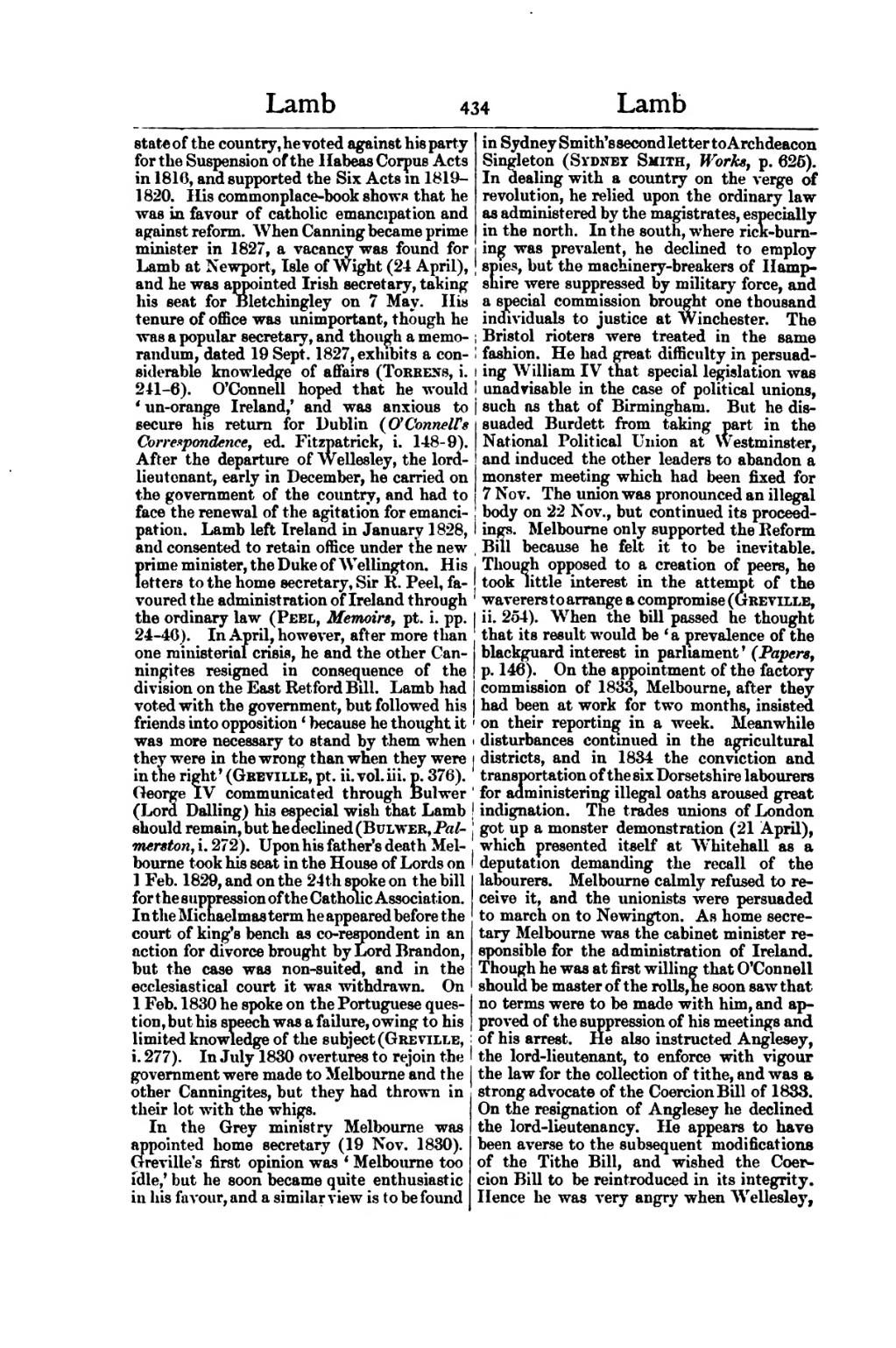state of the country, he voted against his party for the Suspension of the Habeas Corpus Acts in 1816, and supported the Six Acts in 1819–1820. His commonplace-book shows that he was in favour of catholic emancipation and against reform. When Canning became prime minister in 1827, a vacancy was found for Lamb at Newport, Isle of Wight (24 April), and he was appointed Irish secretary, taking his seat for Bletchingley on 7 May. His tenure of office was unimportant, though he was a popular secretary, and though a memorandum, dated 19 Sept. 1827, exhibits a considerable knowledge of affairs (Torrens, i. 241–6). O'Connell hoped that he would ‘un-orange Ireland,’ and was anxious to secure his return for Dublin (O'Connell's Correspondence, ed. Fitzpatrick, i. 148–9). After the departure of Wellesley, the lord-lieutenant, early in December, he carried on the government of the country, and had to face the renewal of the agitation for emancipation. Lamb left Ireland in January 1828, and consented to retain office under the new prime minister, the Duke of Wellington. His letters to the home secretary, Sir R. Peel, favoured the administration of Ireland through the ordinary law (Peel, Memoirs, pt. i. pp. 24–46). In April, however, after more than one ministerial crisis, he and the other Canningites resigned in consequence of the division on the East Retford Bill. Lamb had voted with the government, but followed his friends into opposition ‘because he thought it was more necessary to stand by them when they were in the wrong than when they were in the right’ (Greville, pt. ii. vol. iii. p. 376). George IV communicated through Bulwer (Lord Dalling) his especial wish that Lamb should remain, but he declined (Bulwer, Palmerston, i. 272). Upon his father's death Melbourne took his seat in the House of Lords on 1 Feb. 1829, and on the 24th spoke on the bill for the suppression of the Catholic Association. In the Michaelmas term he appeared before the court of king's bench as co-respondent in an action for divorce brought by Lord Brandon, but the case was non-suited, and in the ecclesiastical court it was withdrawn. On 1 Feb. 1830 he spoke on the Portuguese question, but his speech was a failure, owing to his limited knowledge of the subject (Greville, i. 277). In July 1830 overtures to rejoin the government were made to Melbourne and the other Canningites, but they had thrown in their lot with the whigs.
In the Grey ministry Melbourne was appointed home secretary (19 Nov. 1830). Greville's first opinion was ‘Melbourne too idle,’ but he soon became quite enthusiastic in his favour, and a similar view is to be found in Sydney Smith's second letter to Archdeacon Singleton (Sydney Smith, Works, p. 625). In dealing with a country on the verge of revolution, he relied upon the ordinary law as administered by the magistrates, especially in the north. In the south, where rick-burning was prevalent, he declined to employ spies, but the machinery-breakers of Hampshire were suppressed by military force, and a special commission brought one thousand individuals to justice at Winchester. The Bristol rioters were treated in the same fashion. He had great difficulty in persuading William IV that special legislation was unadvisable in the case of political unions, such as that of Birmingham. But he dissuaded Burdett from taking part in the National Political Union at Westminster, and induced the other leaders to abandon a monster meeting which had been fixed for 7 Nov. The union was pronounced an illegal body on 22 Nov., but continued its proceedings. Melbourne only supported the Reform Bill because he felt it to be inevitable. Though opposed to a creation of peers, he took little interest in the attempt of the waverers to arrange a compromise (Greville, ii. 254). When the bill passed he thought that its result would be ‘a prevalence of the blackguard interest in parliament’ (Papers, p. 146). On the appointment of the factory commission of 1833, Melbourne, after they had been at work for two months, insisted on their reporting in a week. Meanwhile disturbances continued in the agricultural districts, and in 1834 the conviction and transportation of the six Dorsetshire labourers for administering illegal oaths aroused great indignation. The trades unions of London got up a monster demonstration (21 April), which presented itself at Whitehall as a deputation demanding the recall of the labourers. Melbourne calmly refused to receive it, and the unionists were persuaded to march on to Newington. As home secretary Melbourne was the cabinet minister responsible for the administration of Ireland. Though he was at first willing that O'Connell should be master of the rolls, he soon saw that no terms were to be made with him, and approved of the suppression of his meetings and of his arrest. He also instructed Anglesey, the lord-lieutenant, to enforce with vigour the law for the collection of tithe, and was a strong advocate of the Coercion Bill of 1833. On the resignation of Anglesey he declined the lord-lieutenancy. He appears to have been averse to the subsequent modifications of the Tithe Bill, and wished the Coercion Bill to be reintroduced in its integrity. Hence he was very angry when Wellesley,
